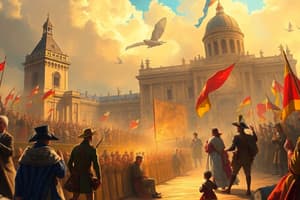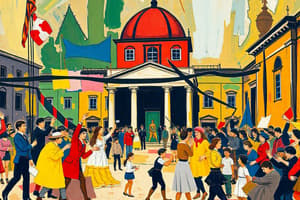Podcast
Questions and Answers
What significant action did the National Assembly take regarding church property?
What significant action did the National Assembly take regarding church property?
- Exempted it from all taxation
- Seized it and sold it off for national funds (correct)
- Returned it to the monarchy
- Converted it into public schools
What event symbolized the beginning of the French Revolution on July 14th, 1789?
What event symbolized the beginning of the French Revolution on July 14th, 1789?
- The formation of the National Assembly
- The signing of a new constitution
- The storming of the Bastille (correct)
- The abolition of feudal privileges
Which document written by Abbé Sieyès helped articulate the demands of the Third Estate?
Which document written by Abbé Sieyès helped articulate the demands of the Third Estate?
- The Declaration of the Rights of Man and Citizen
- What is the Third Estate? (correct)
- The Rights of Man
- The French Constitution
In the new constitution created by the National Assembly, which of the following was a criterion for determining voting eligibility?
In the new constitution created by the National Assembly, which of the following was a criterion for determining voting eligibility?
What was a key demand of the peasants, artisans, and women forming part of the Third Estate?
What was a key demand of the peasants, artisans, and women forming part of the Third Estate?
Flashcards are hidden until you start studying
Study Notes
The National Assembly of the Third Estate
- On June 20th, 1789, the representatives of the Third Estate met in Versailles.
- They declared themselves the National Assembly and vowed to draft a new constitution for France to limit the monarch's power.
- The representatives were led by Mirabeau and Abbé Sieyès.
The Revolt Starts at the Bastille
- A severe winter led to poor harvests, and resulted in increased bread prices.
- Bakers capitalized on the situation by hoarding bread supplies.
- Angry women and crowds waited for long periods in queues at bakeries.
- On July 14th, 1789, an angry crowd stormed the Bastille, a symbol of royal authority.
- Rumors spread in the countryside that lords were hiring robbers to destroy crops. This led to a series of peasant attacks on chateaux, looting of grain stores, and the burning of documents related to feudal dues.
The Third Estate
- Mirabeau, a noble, renounced feudal privileges.
- Abbé Sieyès, a priest, wrote the influential pamphlet, "What is the Third Estate?"
- Peasants, artisans, and women demanded entry into the assembly and voting by the whole body of representatives, not by estate.
The Laws Made
- The National Assembly abolished "Tithes" and seized church property, resulting in a government income of 2 billion livres.
- The National Assembly created a new constitution that changed the powers of the monarchy.
- "Active Citizens": Male taxpayers were granted voting rights based on their eligibility.
- Declaration of the Rights of Man and the Citizen's freedom of speech: Significant Constitutional Rights were recognized.
Studying That Suits You
Use AI to generate personalized quizzes and flashcards to suit your learning preferences.




